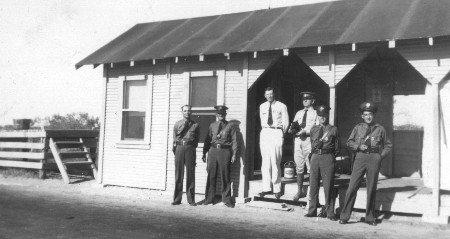
Leon (5th from left), about 1940, at his Border Patrol Station,
with his partner (6th from left)
During the Great Depression, it had, of course, often been very hard to get and keep good employment. Before he'd met Julia, Leon had a variety of jobs. When she first became acquainted with him, he was working for his father, the Nazarene preacher for Waco, TX, for $1 a day, helping tear down the old church building while a new one was being finished. At this time he lived with his folks, Papa Frank and Mama Pearl.
Many of the male church members, including Papa Frank, worked on constructing the new, larger Nazarene church, situated about two miles away from the old one and up a big hill. All the salvageable wood from the old structure was used in the new edifice. The women helped by providing food and drinks. Julia says Papa Frank was very proud to have completed the much bigger, newer structure without any debt. The extra materials needed were either donated or paid for with greater contributions, as they had progressed with the building.
Leon sang in the church choir, as did Julia. They often wound up singing next to one another at rehearsals. It was 1938. He was about twenty-six, she sixteen. Julia had noticed him. He was a handsome, if rather shy, man and had an excellent singing voice.
She saw him once in the company of a woman named Lucile and her young child, Bob, and assumed they were a couple, that Bob was their son. As it happened, Lucile and Bob had just been visiting. Before they had left, Julia learned they were Leon's sister (later, of course, my Aunt Lucile) and nephew. Lucile was (and is) married to a man I would later come to know as Uncle Shelby. Bob, now a physician with an active practice, is my cousin.
 Leon (5th from left), about 1940, at his Border Patrol Station, with his partner (6th from left) |
But eventually he questioned his mother about whom she thought he might date. It was she who suggested Julia as someone he should ask out. (He'd been pleased, as he thought her the most attractive of the available women he'd met in Waco.) And so he did. The two of them seemed to get on quite well at first.
Meanwhile, the church demolition job had ended. Leon, unable to find better, steady work, volunteered for the Army. He was stationed at Fort Sam Houston in San Antonio, TX, where he completed basic training and a period of active duty but was still just a "buck private," making $21 a month (and so not offering very marriageable prospects) as war was proceeding in the Far East and heating up in Europe (1939-1940).
Leon had earlier taken the Federal Civil Service Exam and done well on it, applying then for a variety of civil service positions. But as there was little or no hiring at the time, he was offered no civilian government employment. However, while he was serving in the U. S. Army, he was finally notified of an opening near Falfurrias, TX, as a border patrol officer. The job paid $300-400 a month, then an immense sum.
In those days it was common for men to buy their way out of active duty army service, though this option would not relieve them of a U.S. Army Reserve obligation. So, Leon borrowed $300 from his father, paid off his active duty military service, was honorably discharged, accepted the border patrol job, and moved to the Texas Rio Grande Valley. (The first picture shows Leon at his Border Patrol Station on the highway south of Falfurrias, TX, where he and his partner would stop and check all traffic. They had been on duty all night when the picture was taken and were just being relieved by two other uniformed Border Patrol officers [far left]. The men in civilian clothes in the photo worked for the Agriculture Dept. and would collect fruit from those being stopped.)
Though it was quite a long drive, he started a habit of traveling, over off-duty weekends, to Waco, where he continued his romantic involvement with Julia, again staying, while in town, with his folks. Leon and Julia also kept up a prolific mail correspondence.
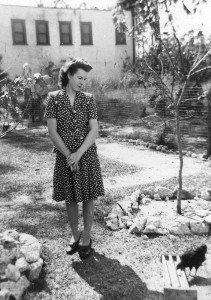 Julia in her and Leon's yard, in Tampa, FL, eyeing one of their large flock of chickens, about 1942 |
It was not too long before he bought a set of rings and, with his now impressive income seemingly secure, asked for Julia's hand. She accepted his offered engagement.
Her friends and relatives were impressed that she would soon be marrying a minister's son, who was also a good looking fellow with excellent prospects, indeed, a man who cared enough for her to drive hundreds of miles, back and forth, to see her on free weekends.
The border patrol position involved quasi-military training. Much of his time in the new role, in fact, was spent learning the ropes. This pedagogy in regimental ways looked good on his résumé when, in 1941, the Army Reserves were called up, prior to Pearl Harbor, but as the war was clearly threatening our borders as well.
Leon's record was likely enhanced as well by his background in communications. His hobby had been Ham Radio operation. He had become proficient in the sending and receiving of Morse Code.
Julia has pointed out that he had gotten interested in having his own Ham Radio station when he was laid up for about six months, while healing from a severe motorcycle accident. (This had occurred while he was a freshman at the Nazarene College. It had resulted in major laceration injuries to both his legs. Anguish over the nature of the medical treatment he received then, which he felt was inadequate, humiliating, and/or even harmful, was probably the basis for his decision thereafter never to seek medical assistance, even when, as with the incident of having been gored in the face and eye, the circumstances were extreme. The motorcycle trauma had also put an end to his academic career, at least for the time being, partly due to a disagreement with Papa Frank over funds, after Leon's father had earlier prevailed upon him to forego another college, to which he had scholarships, in favor of the religious collegiate setting Papa Frank preferred for him. But that is another story.)
Back in the Army again, he was thus promptly offered Officer Candidate School (OCS). In a little over six months he was aged 29 and the greenest of green new second lieutenants when the Japanese bombed Pearl Harbor and millions of young American men, those who had already been on active duty as well as a host of new volunteers and draftees, prepared to be among the first waves of forces to respond to the Axis Powers with whom we were then at war, Japan, Germany, and Italy.
After the surprise Japanese attack, Leon was transferred almost immediately from Texas to Camp Haan, an Army post near Riverside, CA, in charge of his own company of inexperienced soldiers, whom he was helping to get ready for their missions overseas. Perhaps because of his Ham Radio experience, he was assigned to the Army Signal Corps. (Julia adds the following details: "Dad [Leon] was stationed at Camp Bowie, TX, just after finishing OCS, listed as Company Training Officer, with [the] Signal Corps Battalion, then sent to Camp Haan, CA, as Company Commander, then to Drew Field, FL, as Adjutant, S-2 (intelligence). He got his diploma from Radio Association of America for a course in Radio and Electricity in 1930. In 1935, he had his own radio repair business, in Wichita, KS. His OCS training was at the U.S. Army Signal Corps, in Ft. Monmouth, NJ, in 1941.")
But I am getting a bit ahead of the tale.
Because he had still been vulnerable to call-up from the U. S. Army Reserves, Leon had not had that long in his new border patrol position, after training, to pay off his debt to his father and save up his higher earnings, before he was again in the Army and receiving much lower pay. Even a second lieutenant, though vastly better off than the privates, in 1941 made significantly less than $300-400 a month. In wartime he was also at much greater risk. Besides this, his duties often were more around the clock.
And the spouse of an Army officer, particularly at that time, was expected to take a keen interest in and to facilitate his social life, with dinner parties in one's own home, other meetings with the officer's boss and his spouse, volunteer activities in support of the military efforts, and other functions designed to politically lubricate the officer's intended slide up the career ladder.
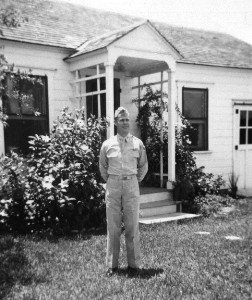 Leon, in front of his and Julia's 1st house, in Tampa, FL, about 1943 |
While Leon was away for his six months of OCS training, and after giving the matter serious thought, she regretfully took his ring to Mama Pearl, asking her to give it back to him. They had no further dates, then, over the next few months before the United States officially entered World War II.
But after Pearl Harbor and Leon being quickly shipped off to CA, perhaps within weeks to be fighting along with thousands or millions of other servicemen in foreign lands, seas, and air, faced with the prospect of perhaps never seeing him again, yet feeling a natural pride in our country's warriors, her affection for Leon was rekindled and she sent him a Christmas card, signing it with the promising salutation "I love you." Their correspondence quickly became intense. Soon she had again agreed to marry him, determined to overcome her anxieties and be a good officer's wife.
Leon sent her a bus ticket. At the end of January, Julia headed west with her few belongings. She arrived in Riverside, CA, where he had rented a duplex for them. A few days after their blood tests and getting the marriage license, they were married, about 6:00 PM on 2/3/42, in the home of the local Nazarene minister. She was nineteen and he twenty-nine.
Besides the preacher's wife, the witnesses were just the couple living on the other side of their duplex. Though they did not know Julia or Leon, in the spirit of the times they agreed to attend the wedding.
As troops were in fact as quickly as possible being prepared for warfare, men who for the most part had little or no previous military background, Leon was then extremely busy. Ironically, in view of his lifelong awkwardness in many social settings, he had also been assigned duties for the battalion as morale officer, responsible for arranging dances, movies, and other entertainments for the men during the few hours the troops would have of free time. Given his packed schedule, he was routinely getting back to the duplex in that period only very late at night, having left quite early in the morning.
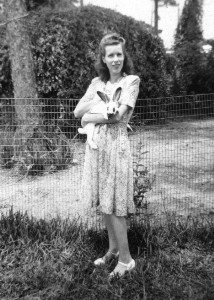 Julia ("five months pregnant with Larry") and one of her and Leon's rabbits, in Tampa, FL, June, 1943 |
But his commanding officer granted him one day off for a honeymoon. So, the evening of their wedding, they boarded a Greyhound bus for Los Angeles, where they stayed the night in the then quite famous and luxurious Ambassador Hotel. They enjoyed a sumptuous breakfast the next morning at the Brown Derby Restaurant, said to be a hangout of famous actors and actresses, though they did not happen to see any while they were there. Then, in the time remaining before their return bus trip, they walked about Hollywood, up and down its interesting, famous streets.
Less than ten days after they were married and settled together in CA, Leon got new orders, assigning him to the Army Air Corps' Drew Field, at Tampa, FL. He was to assist with background security checks on men who would be part of the Early Warning Radar program.
There, in Tampa, late in October of the following year, their first child was born. Mom was twenty-one, my father, thirty-one.
Julia must have mastered her new duties as an officer's wife fairly well, for Dad was quickly promoted by his new commander, a colonel and a former reservist himself, to whom Leon was assigned as adjutant or aide. The colonel recognized that he himself was not as well versed in Army regulations and protocol as was my father and prized the latter's ability to quickly come up with the right references on demand. Within two years, and before leaving Florida, early in 1944, Leon had been promoted again and was now a captain. (A few years later he became a major and then lieutenant colonel. Before he retired, he was working at the Pentagon as the aide for the general in charge of all U. S. Air Force special investigations. Had he been able to complete a college degree, he almost certainly would have made full colonel.)
In early 1944, along with the rest of the Early Warning Radar unit, Dad was shipped over to Hawaii. Mom believes he was in charge of a company of (the larger unit's) troops on the military train out to the west coast.
Dad was fond of telling a story about the ship used for moving their soldiers to Hawaii having broken apart in a big storm, that part of the vessel sank with all on board, while the other part, despite severe damage, did not go down before most all were rescued. His account of the tragedy included descriptions of the waves as having been much larger than a house and rising far above the ship, before repeatedly smashing into it. In my childhood he had told this tale to make it sound as if he had been on that ship at the time and was only still alive because his section of the craft survived the tempest. No doubt there are many similar war stories. Unfortunately, such things did happen, though perhaps it is more likely the vessel suffered a collision that broke it up rather than just a storm. Later, however, I got the impression that, while this may have been something that occurred to one of the vessels taking troops overseas, perhaps even the very one he had himself been on earlier, the incident probably did not actually affect Dad directly. In any case, his unit got safely to Hawaii.
I have wondered why Dad related that troop transport ship story so often through the years. I think now that, if only unconsciously, he may have seen it as a dramatic metaphor for what actually did occur. After all, like each of the soldiers on that vessel before it broke apart in a typhoon, he had willingly put his life on the line, aware of huge risks to each man's safety in the maelstrom of war. At the outset, none knew who would be rushed into the conflict, who might still be alive at the end of the venture. Each man just had his part to play, his orders to follow. Some survived, while some were ground up and destroyed by the "winds of war." I am certain Leon would have done his duty just as well and conscientiously had be been among the first to go into harm's way or if, as with the majority of those with whom he sailed to Hawaii, he had been sent on from there into the island-hopping battles by which the Allies steadily, but often at supreme personal cost, reclaimed strategic Pacific territories from the Japanese. As it happened though, he was among those on the side that did not go down, though the ghosts of those who had perished may still have been with him as he later landed safely on the shores of their defeated enemies' homeland.
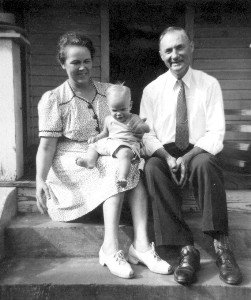 Mama Pearl, Larry, and Papa Frank, about 1944 |
Dad was given fairly nice officer's quarters while in Hawaii. With more leisure time than in either CA or FL, he became quite good at ping-pong during that duty assignment.
The following year, though, right after the war had ended with the enemy surrender, he received new orders that took him to Japan, where he served as a war crimes investigator, indirectly under General Douglas MacArthur.
As with most couples separated by the war at that time, Julia had become accustomed to handling things on her own, while Leon was completely out of the picture. And he, meanwhile, had become more accustomed to people doing exactly what he ordered, and quickly. The Oriental women he had observed also seemed more deferential to their men than came naturally to the rather independent American wives.
He had also put on a little more weight, a tendency that had begun during his relatively luxurious tour of duty in the Hawaiian Territory. Julia, when he returned, felt too that he might have been changed by his experiences. Maybe the war crimes interrogations and investigations he had conducted had hardened him somewhat.
And so, like many other war brides and husbands, when the war and the soldiers' tasks in foreign nations had ended and lovers were again united, they had some reacquainting and adjusting to do. They must have managed that pretty well, though, for they would have seven more children. They remained together for fifty-three years, before Dad's death in 1995.
(The foregoing is based on my own memories and interpretations plus notes I took from comments of my mom during her recent review of an old photo album, some of its pictures over sixty years old. If there are mistakes in the account, they are mine, in not accurately transcribing or understanding Julia's words. I welcome any corrections or clarifications and will gladly print them in a future issue.)